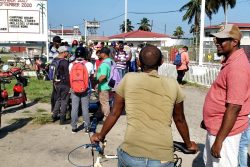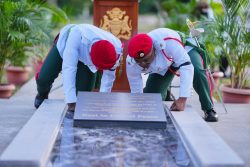Much has been written in recent weeks regarding the estimated US$300 million windfall which the 2024 Cricket World Cup is likely to bring to the Caribbean even though that amount, unequally divided among most of the CARICOM member countries, does not amount to anything even remotely resembling a King’s ransom. But that is not all. There is also a price in security risk that had not applied previously but which now adds a relatively new, demanding dimension of responsibility to the respective host countries.
As reported in this newspaper on May 3rd, the Implementation Agency for Crime and Security (IMPACS) recently advised CARICOM of an Islamic State threat to the upcoming T20 ICC World Cup in the United States and the Caribbean.
So that if it is, decidedly to the region’s credit that it has been given the task/challenge/privilege of hosting the 2024 Cricket World, it has come with challenges some of which were virtually non-existent, or at least less weighty than had been the case over the previous decades.
Still it is, decidedly, a feather in our cap that the Cricket World Cup (CWC) has come to the Caribbean. The timing has coincided with a period in which sport has become linked to other forms of vigorous public entertainment so that what the Caribbean has been afforded is not just the hosting of a prestigious cricket tournament but, as well, the parading of the region’s transforming of itself on a global stage. No dollar figure can be put to that opportunity.
In proffering this assessment of the potential value of CWC 2024 to the Caribbean it would be naïve, to say the least, to ignore the enormously transformed global environment in which international relations, of which cricket is a part, now dwells. Here, the arrival of intelligence and information from North Pakistan regarding the likelihood of security-related disruptions to the Tournament can hardly be said to be a bolt from the blue, never mind the fact that it appears to have sent something of a ripple through the region. The region, as a whole, has been given notice that it must now raise its security threshold beyond ‘pat down’ body searches and the rummaging of lunch baskets at the entrances to every venue in the region. The nature of the implied security threat requires a serious level of intra-regional contemplation and almost certainly the importation into the region of forms of security support without which we will probably remain worryingly vulnerable.
Here the question arises as to whether the individual law enforcement and national security mechanisms in the region are anywhere near ‘up to scratch’ in terms of ‘covering all of the bases’ associated with likely terror threats to the region during CWC 2024 or whether, for all the seemingly animated nature of the intra-regional security discourses surrounding CWC 2024, the North Pakistan ‘noises’ do not bare the worryingly startling realities of the region’s public security vulnerabilities, when the challenge extends into the realm of a likely sophisticated terror threat.
Contextually, it is important that we in the Caribbean contemplate the extent to which, either as individual jurisdictions or as a region we have even begun to take account of the extent to which considerations of national security have incrementally stepped up by a more menacing terror dimension. As a region should these realities not now be written into our individual and collective public safety regimes?
Here, while one doubts that, as a region, we are ‘up to scratch’ insofar as being aware of the changing landscape of public security in response to a growing landscape of global terror. Are we not now compelled to place the issue of global terror in all of its dimensions on our national security agendas rather than to simply treat it as an issue to be ‘talked around’ at local and regional public security fora?
CWC 2024 should serve as a reminder that since we cannot insulate ourselves from the contemporary international community and by extension from what is now the full-blown reality of global terror we must do what we can, as individual jurisdictions and as a region to erect such defences as we can. There is really no persuasive evidence that this is a priority focus of CARICOM member states at this time. That has to change.
If an argument can be made for Guyana, per se, not being a likely ‘priority’ target for a terror attack that is, decidedly, a specious argument since it is the global profile of the event and not, necessarily, the host venue, that is usually the real target of the terrorist. This is what affords these heinous acts the global attention that they seek.





